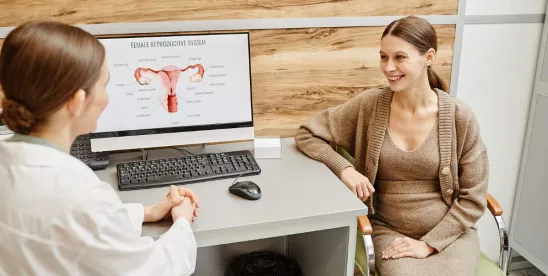Highlights
The HHS-OIG released a favorable opinion regarding a biotechnology company providing travel support and an unfavorable opinion regarding the company providing fertility services support
The travel support satisfies the “promote access to care exception” to the civil monetary penalty against beneficiary inducements (CMP) and includes factors that limit risk under CMP and Anti-Kickback Statute
The fertility support does not qualify for any exception, and includes prohibited remuneration under both the CMP and Anti-Kickback Statute
The HHS-OIG determined there was insufficient data regarding the fertility support to conclude a low risk of fraud and abuse
The U.S. Department of Health and Human Services’ Office of Inspector General (HHS-OIG) recently released Advisory Opinion No. 24-05, a favorable opinion regarding the federal Anti-Kickback Statute (AKS) and civil monetary penalty laws against beneficiary inducements (CMP) as applied to travel, lodging, meals, and other travel expense assistance to patients and caregivers provided by a biotechnology company, and an unfavorable opinion regarding the company’s provisions of fertility preservation services.
Travel Support
The biotechnology company produces gene therapies for severe genetic diseases. Two gene therapy drugs are subject to the proposed arrangement – each with a list price of more than $2 million. There are a limited number of hospital treatment centers and physicians that can provide the treatment. A patient’s stay at the hospital treatment center varies from four weeks to six weeks after infusion to allow the healthcare team to monitor recovery and potential complications.
The proposed travel support offers assistance to qualified patients and caregiver(s) as follows: for a patient 26 years old and older, the assistance covers one patient and one caregiver, and for those under 26 years old, the assistance covers one patient and two caregivers. The assistance includes: 1) airfare (if patient is located more than 300 miles away from the treatment center) or ground transportation, 2) lodging, and 3) other support during the stay, including up to $50 per day for meals, local transportation, or gas.
The proposed travel support is limited to patients with income at or below 600 percent of the federal poverty level who 1) meet distance requirements from treatment centers, 2) lack, or have exhausted, assistance through insurance or treatment centers, and 3) have a consultation appointment to determine gene therapy eligibility or an on-label prescription for one of the drug products offered. In addition, the company certified that it would not advertise the proposed arrangement, use the arrangement as a marketing tool, or require the hospital treatment centers to prescribe or use the gene therapies exclusively.
In this instance, the HHS-OIG concluded that the proposed travel support constitutes remuneration under the AKS to patients that could induce them to purchase the biotechnology company’s drugs. The agency also determined the proposed arrangement constitutes remuneration to the hospital treatment centers and treating physicians who earn fees based on patients selecting their treatment center, which the patients may not have otherwise selected.
The HHS-OIG determined the biotechnology company enabling patients to select these treatment centers could spur the treatment centers to recommend, and physicians to order, the company’s drug. Although the AKS is implicated and there is no applicable safe harbor, the HHS-OIG determined the risk of fraud and abuse was sufficiently low and it would not impose sanctions on the arrangement.
The HHS-OIG cited the following factors as limiting the possibility for fraud and abuse under the travel support program:
- The proposed travel support arrangement removes barriers to accessing medically necessary care.
- The proposed travel support arrangement facilitates compliance with the drug label instructions for an extended time at the hospital treatment center.
- The gene therapy is a one-time treatment that is potentially curative, and therefore not likely to lead to additional referrals or increased costs in the future.
- The arrangement includes safeguards to mitigate risk such as not authorizing assistance when insurance, the hospital treatment center, or a third party already provides assistance.
The HHS-OIG also concluded that the travel support implicates the CMP against beneficiary inducements since the expense assistance could induce patients to select certain hospital treatment centers and physicians that patients otherwise would have not selected for treatment. However, the HHS-OIG determined the travel support satisfies the “promotes access to care” exception under the CMP by improving the beneficiary’s ability to obtain items and services payable by Medicare or Medicaid and presenting low risk of harm to Medicare and Medicaid and its beneficiaries.
Ultimately, the HHS-OIG determined the proposed travel support carried a sufficiently low risk of fraud and abuse, and accordingly, it would not impose administrative sanctions under either the AKS or CMP statute.
Fertility Support
Under the proposed fertility support, the biotechnology company would provide $22,500 for fertility preservation and storage (including sperm banking and egg freezing) to every qualifying patient receiving its drugs, in order to combat the infertility side effects of its gene therapy drugs. Fertility support would be available to patients with income at or below 600 percent of the federal poverty level who 1) meet distance requirements from treatment centers, and 2) lack assistance through other insurance, the treatment center, or treating fertility specialist. Patients would only be eligible to receive fertility support once, but would be able to pursue multiple cycles and/or attempts.
The agency determined the fertility support aspect of the proposed arrangement would implicate the AKS by providing remuneration in two ways. First, it would induce patients to receive the company’s drugs in light of the drugs’ infertility risk. Second, it would result in remuneration to the treatment centers and treating physician through the provision of services to patients who would have otherwise forgone treatment due to the risk of infertility. The HHS-OIG also determined the fertility support payment would implicate the CMP’s bar on beneficiary inducements considering it could induce patients, who otherwise could not afford fertility services, to select the company’s drug treatment.
The HHS-OIG noted the biotechnology company provided insufficient data for the agency to determine the risk of fraud and abuse. Specifically, the HHS-OIG explained that it could not accurately determine the following:
- Increased or decreased access to healthcare services;
- Increased or decreased costs to federal healthcare;
- Improved patient outcomes;
- Competitive effects; and
- Risk of improper steering
Further, the agency explained that the fertility support did not fit within the CMP statute’s promotes access to care exception, nor would it fit within any other exception based on the limited data provided. Ultimately, the HHS-OIG declined to issue a fully favorable advisory opinion based its inability to make a full assessment of the risk of fraud and abuse associated with the fertility support.
Nevertheless, the agency left the door open for similar fertility support arrangements when additional data is available for it to fully assess the risk of fraud and abuse in light of the potential patient benefits.
Key Takeaways
Similar to previous Advisory Opinion 24-03, this opinion serves as a reminder that pharmaceutical and/or biotechnology companies can fund patient and caregiver assistance when key safeguards are included and the assistance promotes patients’ access to care. This opinion also stresses the importance of providing sufficient data to the HHS-OIG when requesting an advisory opinion. Without sufficient data for the HHS-OIG to assess the risk of fraud and abuse, the agency is unlikely to provide a favorable opinion.





 />i
/>i
